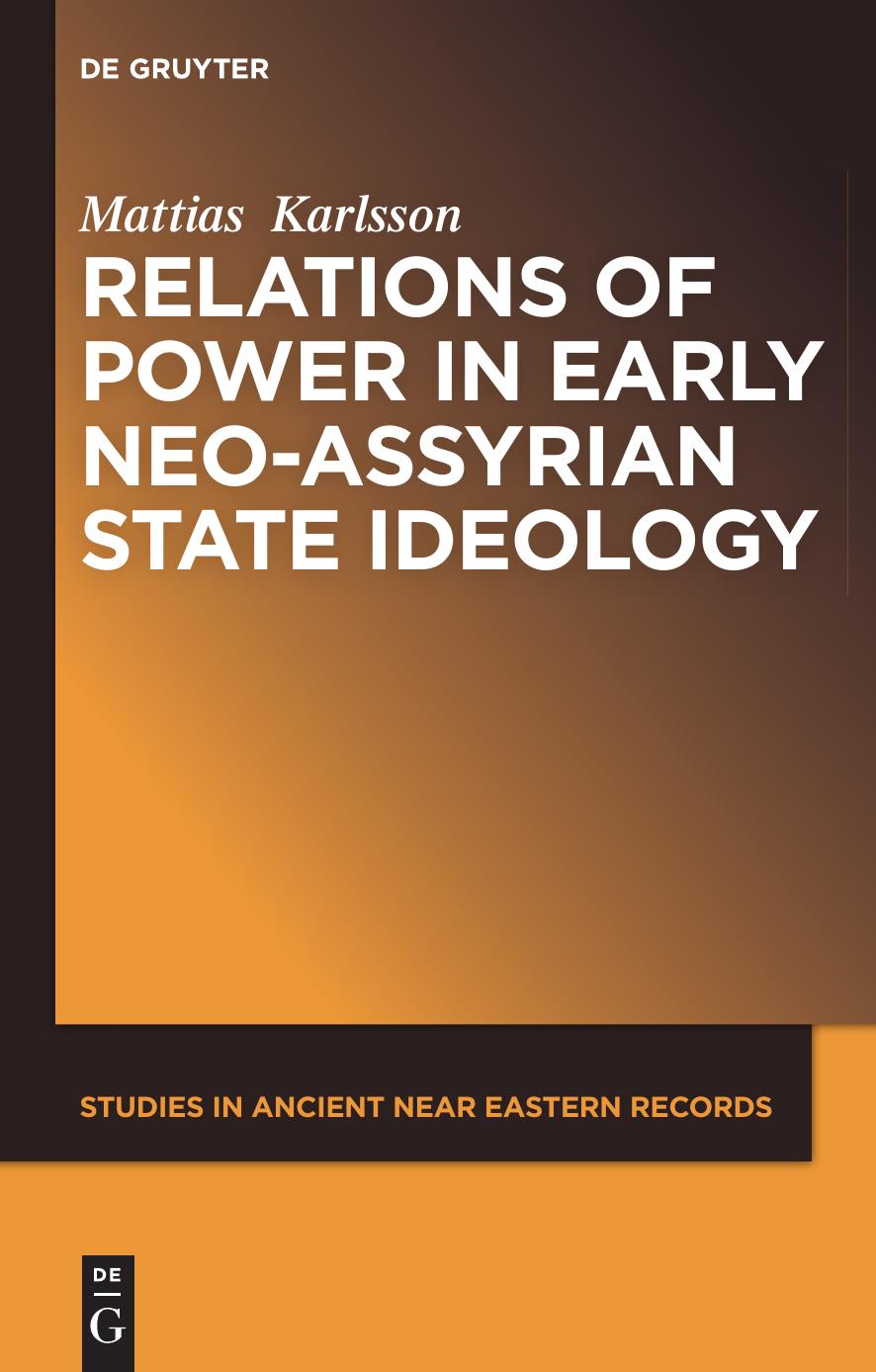Relations of Power in Early Neo-Assyrian State Ideology by Mattias Karlsson

Author:Mattias Karlsson
Language: eng
Format: epub, pdf
Publisher: Walter de Gruyter
Published: 2016-05-25T16:00:00+00:00
5.4.6Alleged roles of ethnicity and nationalism
In this subsection, the claims of a crucial Assyrian/foreign dichotomy in Assyrian state ideology is examined more closely. I will argue that an application of the concepts of nationalism and essence-based ethnicity on the Assyrian material is anachronistic and weakly supported respectively. The Early Neo-Assyrian kings, on the contrary, presented themselves as universal, non-nationalistic rulers, and with ethnicity much in the background.
The issue of ethnicity in Mesopotamia has of course been discussed earlier in Assyriology. This is especially true of the discussion on the distinction between Sumerians and Akkadians (e.g. Westenholz 1979). In the earliest Assyriology literature, a belief in the relevance of races, nations, and essence-based ethnos for understanding ancient Mesopotamia is often expressed. Nowadays, the scholarly mainstream seems to focus on constructed ethnos, emphasizing language as a dividing line (e.g. Roux 1992: 147–51). Ideas on essence-based ethnos, forming various ancient nations, are however far from abandoned. Bottéro (2001a) e.g. detects a certain Sumerian mentality, at least regarding religious thought, which contrasts to that of the Akkadians who arguably were a part of a larger Semitic ethnos. The identifying of a Semitic nation may be regarded as an important component of many literary productions inspired by Orientalism and its discourses (Said 1978).
Related to this discussion on the role of ethnicity and the existence of nationalism in ancient Mesopotamia are the issues of xenophobia and racism.230 Bottéro (2001a: 96) here argues that racism or “true alterity” did not exist in Mesopotamia, and that “the idea of ‘foreigners’ (aḫû) mattered only on the linguistic, economic, and political level”. In other words, it was not because of their foreignness that Mesopotamian kings went to war against the foreign lands. Robertson (2005: 208) notes that societal tensions produced by ethnic differences rarely are detected in the sources, and that the relational norms rather were coexistence and assimilation. The “stranger/foreigner” (nakru/aḫû) was not stigmatized and did not form a separate social class in Mesopotamia (Machinist 1986; Prechel 1992: 181). This circumstance is also reflected in political discourse. Yoffee (1993: 305) here talks of the “non-national character of Mesopotamian political authority”. Limet (2005: 370–71) even claims that people in Mesopotamia hardly knew ethnic prejudice, and that the general attitude towards foreigners was tolerance. The xenophobia which did exist rather targeted pastoralists and “mountain peoples”.
The topic of ancient Assyria as a “nation” has been discussed frequently. One line of thought identifies a fixed, essence-based Assyrian ethnos expressed in the primary sources. Especially in older literature this identifying is accompanied by referring to Assyrians as a distinct race. However, some scholarly literature of today likewise refers to an idea of “the Assyrian race and nation”, identifying notions of essence-based ethnicity. According to these interpretations, the wars of the Assyrian kings were nationalistic wars, and the relevant relations of power revolved around the concept of nations. This line of thought represents the belief in primordial ethnicity (see s. 1.6).
Another line of thought regarding this nation issue is represented by the Italian school who detects an idea of an ethnic identity of a perennial or constructed sense of the Assyrians (see s.
Download
Relations of Power in Early Neo-Assyrian State Ideology by Mattias Karlsson.pdf
This site does not store any files on its server. We only index and link to content provided by other sites. Please contact the content providers to delete copyright contents if any and email us, we'll remove relevant links or contents immediately.
The Daily Stoic by Holiday Ryan & Hanselman Stephen(2708)
The Fate of Rome: Climate, Disease, and the End of an Empire (The Princeton History of the Ancient World) by Kyle Harper(2436)
People of the Earth: An Introduction to World Prehistory by Dr. Brian Fagan & Nadia Durrani(2346)
Ancient Worlds by Michael Scott(2102)
Babylon's Ark by Lawrence Anthony(2070)
Foreign Devils on the Silk Road: The Search for the Lost Treasures of Central Asia by Peter Hopkirk(2055)
India's Ancient Past by R.S. Sharma(1986)
MOSES THE EGYPTIAN by Jan Assmann(1971)
The Complete Dead Sea Scrolls in English (7th Edition) (Penguin Classics) by Geza Vermes(1840)
Lost Technologies of Ancient Egypt by Christopher Dunn(1797)
The Daily Stoic by Ryan Holiday & Stephen Hanselman(1768)
The Earth Chronicles Handbook by Zecharia Sitchin(1744)
24 Hours in Ancient Rome by Philip Matyszak(1676)
Alexander the Great by Philip Freeman(1645)
Aztec by Gary Jennings(1544)
The Nine Waves of Creation by Carl Johan Calleman(1519)
Curse Tablets and Binding Spells from the Ancient World by Gager John G.;(1510)
Before Atlantis by Frank Joseph(1483)
Earthmare: The Lost Book of Wars by Cergat(1466)
